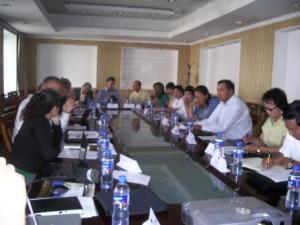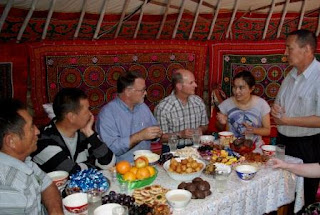We'll give the last word to Ken Doleman, CEO of Swan Valley Credit Union and a partcipant in both the 2010 and 2011 coaching missions to Mongolia. In this post, written following his return to Canada, he reflects on Mongolia's environmental future and the role of the Zoos Hurd Credit Union in environmental sustainability.
There is a bridge in Mongolia’s capital Ulaanbaatar that rises to broach the river, then descends to ground on the other side – much as one would expect. The difference? The river dried up some 25 years ago.
There is a bridge in Mongolia’s capital Ulaanbaatar that rises to broach the river, then descends to ground on the other side – much as one would expect. The difference? The river dried up some 25 years ago.
 |
| Credit Union water conservation project. Foreground: Zoos Hurd SCU Executive Director Nara |
Global climate change, mining development and changing human resource usage patterns are proving cruel taskmasters for water – something we take for granted in Canada. It appears as increased desertification in the Gobi region and a growing number of dry riverbeds throughout the country where water once flowed. The April, 2010 National Geographic special issue predicts that in 15 years, 1.8 billion people will live in regions of severe water scarcity. Furthermore, glacial loss in the high heart of Asia could lead to the greatest human migration in history. Yes, people follow water.
No, there aren’t any elephants in Mongolia. Yet, water bills in Ulaanbaatar are one tenth of the cost borne by users in Ottawa. In stark contrast, a small credit union in the north-eastern Khentii aimag (province) is facing the future by taking action today.
 |
| Ken Doleman interviews Shuraa, an environmental leader and founding member of the credit union. |
Their mission: to provide financial and social service for the members to improve their income; and, through these actions to contribute to local economic development. The social component embodies a strong focus on environmental issues that seem to have one thing in common – water. The credit union has fenced in freshwater springs to protect against degradation and provide a secure water source for herder families and livestock. Citizen partnerships following a cooperative model are being supported that now see 8,400 hectares under protection – through forest fire prevention activities; and, the training/promotion of sustainable land use practices.
This concern for community can be attributed in part to founding member Shuraa - a herder and environmental catalyst in the region; and, more particularly, to shared cooperative values. He has seen small rivers and springs drying up over the years. Of water he says simply, “Of course it is very important.”
The Citizen’s Partnership he heads will be sharing best practices for environmental stewardship at an upcoming event in September – having recently won accolades from the government for their work. And he will continue supporting the credit union, whose environmental work is deeply appreciated. After all, he has the future of his 6 children and unnumbered grandchildren to think about.
The soum or regional Governor predicts that the credit union will triple in size in the near term, thanks in no small measure to its focus on environmental issues critical to the membership. The value of being member-centric!
As we leave the Umundelger soum center for the last time, a sign placed by partners in conservation catches my eye. “Trees follow water… water is life” it proclaims. Trees, people… it makes me think of pillars. Pillars like Shuraa and the Zoos Hurd leaders – who by living the co-operative principles and values, are building a sustainable future for their region. In the spirit of co-operation let’s toast their promising future… with water of course.
-- Ken (Itinerant Coach)




































